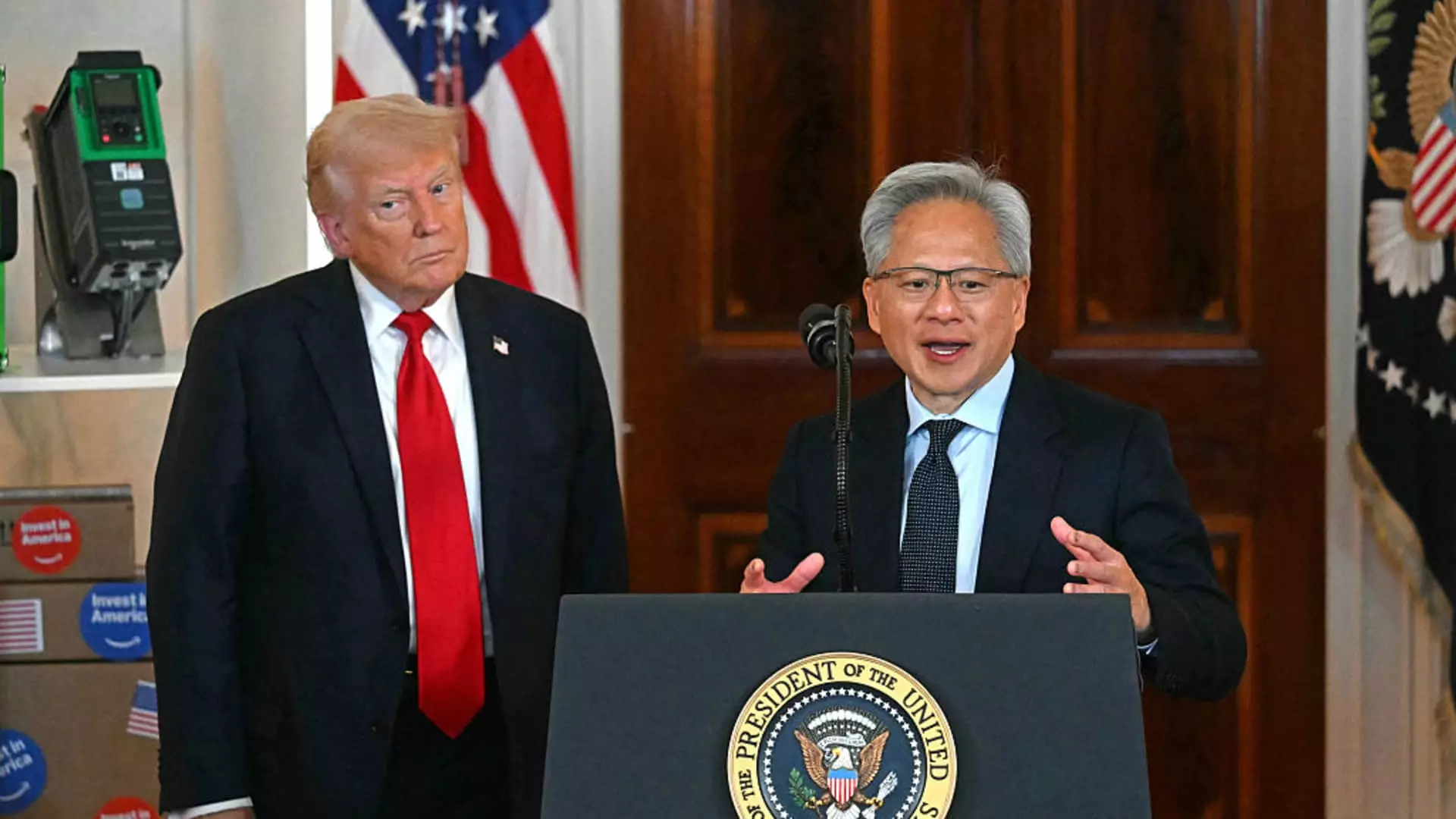In an era where technological supremacy defines geopolitical power, the decision to permit Nvidia and AMD to sell advanced AI chips to China while accepting a 15% cut in revenue is not just a policy blunder—it’s a reckless gamble with America’s security and economic future. This arrangement exemplifies a perilous willingness to trade away hard-earned technological advantages for short-term financial gain. While some may argue that globalization and economic engagement with China are inevitable, at what cost do we accept this engagement? The idea of siphoning revenue from sales to a strategic rival under the guise of economic pragmatism threatens to undermine the very foundation of U.S. innovation leadership.
By allowing these tech giants to profit from sales to China, all under a revenue-sharing scheme, the government effectively incentivizes the transfer of sensitive technologies into the hands of one of our most formidable adversaries. This is not a typical trade agreement but a sidestep around national security principles that should prioritize safeguarding cutting-edge innovation from the reach of hostile nations. The notion that such a scheme could enhance U.S. competitiveness or interests is fundamentally flawed, betraying a dangerous complacency that diminishes America’s technological edge.
Challenging the Narrative of Economic Benefit
Proponents of this deal may argue that revenue sharing fosters economic growth and ensures American companies remain competitive. Yet, this perspective ignores the broader strategic context. When American chips are embedded in Chinese military hardware—an inevitable consequence if the export licenses are granted extensively—the risk escalates exponentially. Commercial sales become conduits for military modernization, potentially accelerating China’s ability to challenge U.S. military dominance.
Nvidia’s assertion that its chips wouldn’t enhance military capabilities appears naive or perhaps dismissive of the reality that AI technology is inherently dual-use. The Chinese military’s rapid technological evolution makes this a vital concern, and entrusting China with U.S. advanced AI chips under revenue-sharing agreements is akin to fueling the engines of future strategic competition. The economic benefits touted by supporters pale in comparison to the potential security costs of unwittingly empowering an adversary.
Leadership, Security, and Moral Responsibility
The opposition voiced by Senate Democrats underscores a fundamental truth: safeguarding America’s technological leadership must trump short-term financial incentives. To do otherwise confirms a dangerous capitulation, diluting the U.S.’s ability to maintain technological dominance in an increasingly competitive global landscape. Allowing revenue-sharing schemes not only risks handing over critical technological advantages but also sends a troubling message about the U.S.’s willingness to compromise on essential security principles under external pressure.
The administration’s decision, as critiqued by the senators, exemplifies a broader failure to prioritize national security over economic convenience. It’s a failure to recognize that technological primacy directly underpins military superiority and strategic autonomy. When the U.S. compromises on this front, it embarks on a perilous road—one where economic gains are fleeting, but the security costs are potentially irreversible.
The Broader Geopolitical Implications
Unquestionably, this decision sends a signal to China that the U.S. is open to economic and technological concessions—an invitation for further encroachments. China’s own policies demonstrate that it is determined to isolate American technology and develop indigenous alternatives, making access to U.S. chips more than mere commercial transactions; they become instruments of geopolitical leverage.
Moreover, the reaction within China reveals skepticism; their reluctance to fully re-engage with Nvidia and the Chinese government’s push to buy from other sources highlight that this deal may be more symbolic than substantive. The Chinese government’s pushback underscores the ongoing struggle for influence over global supply chains, emphasizing that the U.S. must respond with strategic clarity rather than short-term bargains.
The Need for a Clearer, Firm Stance
Moving forward, — especially from a center-right, liberal perspective—the emphasis must be placed on protecting American innovation and security. The U.S. must craft policies that deter technology transfer rather than facilitate it under revenue-sharing schemes that weaken our strategic position. Without decisive action, we risk diminishing our technological sovereignty, leaving future generations vulnerable to China’s ambitions.
The Biden and Trump administrations, despite their differences, should recognize that economic incentives cannot and should not outweigh national security imperatives. The future of American technological dominance hinges on unwavering protection of our strategic assets, not on short-term negotiations that erode the foundation of our global leadership.
Ultimately, the current approach reflects a dangerous naivety and shortsightedness. It’s a wake-up call that American policymakers must reconsider their priorities and understand that our technological edge is not merely an economic advantage but a critical pillar of national security—one that requires steadfast commitment, not reckless compromise.

